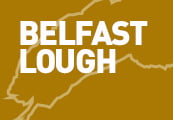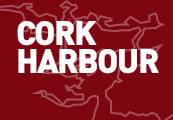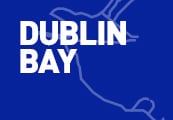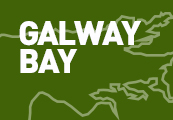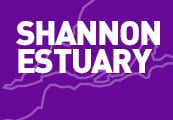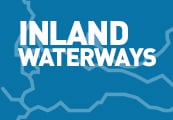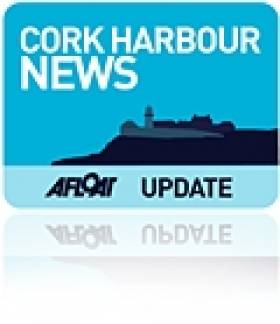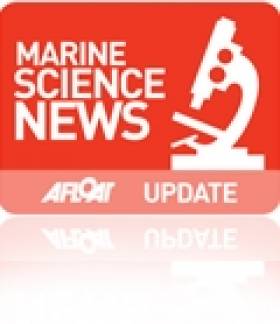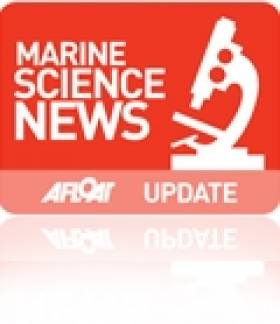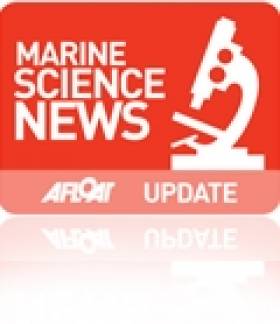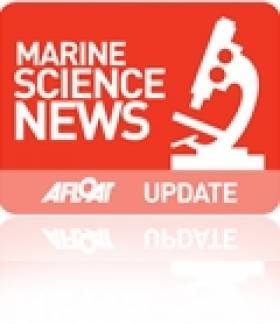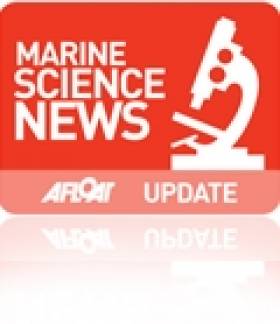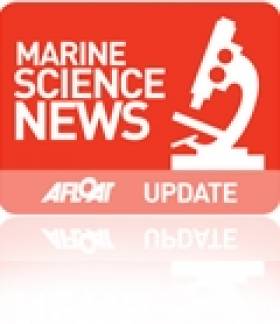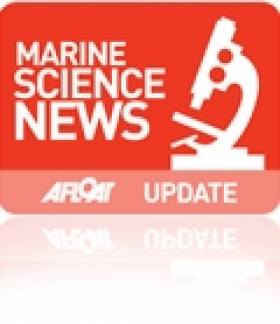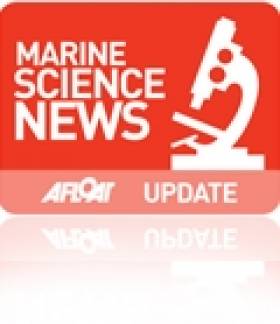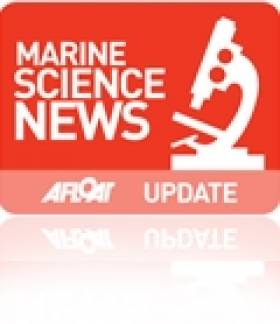Displaying items by tag: Marine Institute
#oceanwealth – A major celebration of Ireland's ocean wealth will take place in Cork harbour this summer. A two day event, 10th and 11th July, is planned for Ringaskiddy and Haulbowline in association with IMERC and with support from Beaufort Laboratory, UCC, the National Maritime College of Ireland, the Naval Service and the Marine Institute.
The event, held under the auspices of the inter-departmental Marine Coordination Group Chaired by Minister Simon Coveney, is an initiative of Ireland's Integrated Marine Plan – Harnessing Our Ocean Wealth. It will
build on the first annual Our Ocean Wealth Conference which took place in Dublin Castle last July attended by about 500 delegates.
This year the organisers hope to attract a wider audience over the two day event which will include a conference, marine technology expo, investor events, workshops, a seafood festival, family fun, and competitions.
By broadening its scope to include a range of activities open to families as well as business and potential investors, the event aims to highlight the social, cultural and economic benefits of Ireland's marine sector and provide a platform for public engagement with Ireland's marine resource.
This event is also an action in the Government's recently launched Action Plan for Jobs 2015.
Major Upgrade To Scientific Equipment On RV Celtic Explorer
#MarineScience - The marine research vessel Celtic Explorer is back in the water with a new suite of hydrographic and geophysical sonar systems.
According to the Marine Institute, the new instruments were installed during an extensive refit in the A&P yard in Falmouth, which began on 29 December under the supervision of P&O Maritime (Ireland) Ltd.
The main work carried out during the refit was the installation of state-of-the-art sonar systems for bathymetric mapping in deep and shallow waters, and the installation of a deepwater sub-bottom profiler.
Adjustments were also made to the hull to fit the Kongsberg EM302 multibeam system and an IXSEA Echoes sub-bottom profiler.
These systems will enhance the seabed mapping capabilities of the Celtic Explorer, with the EM302 echo sounder designed to perform mapping with high resolution and accuracy to depths of 6km. The sub-bottom profiler can operate at the same depths to examine and profile surface bedrock layers and sediments.
The vessel's drop keel has been fitted with an EM2040 multibeam system – the same as that fitted to sister vessel the Celtic Voyager last year – to carry out high resolution seabed mapping in shallower waters. The vessel's positioning and motion reference systems were also upgraded to the highest standard to allow the vessel to operate the new equipment to the required accuracy.
The two-and-a-half-yearly refit included major mechanical work such as the removal of the rudder for inspection and repair and overhaul of the stern thruster. The entire vessel was painted; cabins, laboratories and common areas were refitted; and minor repairs carried out as well as an overhaul of essential systems.
The Celtic Explorer will complete a survey in the North Sea and Baltic Sea before beginning sea trials of the new equipment in Irish waters in February. The capability of the new equipment will be tested in the deep waters off Ireland's West coast under the supervision of scientists from the Marine Institute's Advanced Mapping Services (AMS) team.
Once the new systems have been calibrated and tested, they will be used extensively this year, including on fisheries acoustic surveys where their water column capability will be used to study the aggregation morphology and vessel avoidance behaviour of pelagic fish species, as part of a new PhD study.
The new systems will also be used to map the deep Atlantic seafloor during passage to and from Canada in April-May this year, and will be key during two deepwater ROV surveys this year, one led by University College Cork studying cold water coral reefs, and another led by University College Dublin studying deepwater thermal vent sites on the Mid-Atlantic Ridge.
The Celtic Explorer will deliver an intensive programme of activities in 2015 with a packed schedule to 17 December.
Beyond 2015, the systems will be used extensively to map the Celtic Sea, which will provide valuable data for the sustainable development of Ireland's fisheries as well as allowing Irish scientists the opportunity to play a pivotal role in future research opportunities in the deeper waters of the Atlantic Ocean.
Student Bursars Wanted For Marine Institute Work Experience Programme
#MarineScience - The Marine Institute is inviting students to apply for a number of work experience placements in many exciting areas for this summer 2015.
The bursaries are worth €2,200 each for an eight-week placement based in various locations including the Marine Institute in Oranmore, Co Galway; Newport, Co Mayo; Harcourt Street, Dublin; and ports around the country.
The Marine Institute's Bursary Programme provides valuable practical experience for students, in areas of research such as marine fisheries, salmon management, aquaculture, environment, communications, oceanography, maritime development and bio-discovery.
The bursary programme is aimed at undergraduates of universities, institutes of technology and national institutes for higher education. The Scheme is strictly limited to undergraduates who have completed two years study in a relevant discipline.
Previous bursars have gone on to work in the Marine Institute (including two directors of the institute), Bord Iascaigh Mhara, regional fisheries boards, county councils, pharmaceutical companies and State laboratories, with some going as far afield as the EPA in Sydney, Australia and some now running their own companies.
To apply for the summer bursary programme, see the list of bursary titles on offer (Word doc), select the two bursaries that interest you most (in order of preference), complete the application form (Word doc) and return it FAO Annette Jordan, Marine Institute, Furnace, Newport, Co Mayo. The deadline for applications is Friday 13 February 2015.
#MarineScience - The Marine Institute has carried out Ireland's obligations under the Data Collection Framework (DCF) since 2002. The DCF programme involves at-sea and port sampling of catch and landings, research vessel surveys (eg acoustic, egg, groundfish and underwater TV surveys), management and analyses of data, assessment and provision of scientific advice on the sustainable exploitation of fisheries resources.
Ireland has secured funding under the EMFF (European Maritime and Fisheries Fund 2014 to 2020) to support the implementation of the new DCF and to build capacity in the areas of Regional Fisheries Management Plans; Mixed Fisheries Plans and Regional Discard Plans; in addition to discard and groundfish survey data analyses.
To support delivery of these work programmes the Marine Institute is recruiting two posts: a Team Lead (TL) focused on providing fisheries modelling and simulations support for Regional Fisheries Management Plans; Mixed Fisheries Plans and Regional Discard Plans; and a Scientific and Technical Officer (STO) to work with our Fisheries Ecosystem Advisory Services (FEAS) team to focus on the analyses of discard and groundfish survey data.
The TL will provide statistical support for staff in relation to analyses of data for peer reviewed publications as well as develop assessment methods for data limited stocks particularly monk and megrim in ICES Sub Areas VI and VII.
If you have an interest in working with the FEAS team and believe you have the skills and experience required for either of these roles, then the the Marine Institute would like to hear from you.
Further information about the opportunities can be found in the detailed job descriptions that be downloaded from www.marine.ie.
Please send a detailed letter of application and an up-to-date CV to Human Resources, Marine Institute, Rinville, Oranmore, Co Galway or email to [email protected]. Please note email applications will only be accepted at this address and applications are not valid until you have received confirmation of your application. All applications should include the reference for the relevant vacancy.
The closing date for receipt of applications is 5pm on Wednesday 21 January 2015. Late applications will not be accepted. The Marine Institute is an equal opportunities employer.
Irish Marine Scientists Win €5.5m in EU 'Blue Growth' Research Funds
#marinescience – Ireland's marine researchers have won €5.5m in the latest EU Horizon 2020 competitive funding in the areas of Blue Growth and Sustainable Food and Security.
This represents 4.7% of total EU budget awards and 5% of Blue Growth, a much higher success rate than the 'normal' ratio for Ireland in competitive European funding calls.
Welcoming the success of Ireland's marine research community Dr Peter Heffernan, CEO Marine Institute said:
"Ireland's marine researchers are performing really well, with 12 out of 36 projects with Irish partners funded and a further 15 qualifying to be considered for funding. This shows that marine science is being carried out to the highest standards across State, third-level and SME sectors. The Government's marine strategy - Harnessing Our Ocean Wealth is paying dividends."
Irish research bodies will coordinate three significant projects. One of these projects will see the Marine Institute play a pivotal role in the implementation of the Galway Statement on Atlantic Ocean Cooperation.'
The 'Galway Statement' was signed at the Marine Institute, Galway 24 May 2013 by representatives of the European Union, the Government of Canada and the Government of the United States of America. It is a strong commitment from the EU, US and Canadian Governments to align our ocean observation efforts to improve ocean health and stewardship and promote the sustainable management of our shared marine resources.
A European Commission workshop in Dublin Castle today (Tuesday 2nd December) marks a key step in the implementation of the Galway Statement focussing on Atlantic seabed mapping. EU, US and Canadian participants are working to establish key priorities and approaches for targeted seabed mapping to support ocean observation and forecasting capabilities.
Dr Heffernan added, "It's exciting to see the Atlantic research alliance gather momentum and Ireland has much to bring to this partnership, and much to gain. We have a strong marine research community supported by growing national research infrastructure. This is in addition to our expertise in seabed mapping developed through INFOMAR, the national seabed mapping programme which the Marine Institute carries out in partnership with the Geological Survey of Ireland."
"The gains for all are clearly stated in the 'Galway Statement': " ...an Atlantic Ocean that is healthy, resilient, safe, productive, understood and treasured so as to promote the wellbeing , prosperity and security of present and future generations" ".
Hundreds Of TY Students Visit Marine Institute For Science Fest
#MarineScience - Over 300 Transition Year students from Galway and further afield visited the Marine Institute yesterday (Thursday 20 November) as part of the Galway Science & Technology Festival.
The students met scientists and staff, discovered the wide ranging work of the Marine Institute and got a glimpse of what it would be like to work in marine research.
“We’re delighted to open our doors to students today and we hope they’ll be inspired by the people they meet here and by the work that we’re doing to understand our unique ocean resources," said Marine Institute chief executive Dr Peter Heffernan.
"Some of the students may even go on to become ocean explorers as marine biologists, oceanographers, geographers, mapping the seabed or as engineers, developing novel marine renewable energy devices."
Dr Heffernan also hailed the "many opportunities, particularly with a national and EU focus on the potential of the ‘blue economy’ with the Government plan Harnessing Our Ocean Wealth and the European Commission’s Atlantic Strategy.”
The visit included a talk by Helen McCormick of the Fisheries Ecosystem Advisory Services on the work of the Marine Institute, a 'Sea for Society' video showing the importance of our ocean resource, and an exhibition on marine careers and training opportunities, including the institute's own annual bursar programme for third level students.
Staff and scientists demonstrated their work using touchscreen interactive seabed maps, fish samples and even a mini submarine. They answered well thought-out questions on their work in fisheries science, seabed mapping, seafood safety, oceanography, ocean chemistry and research vessel operations.
For more information on the Galway Science & Technology Festival see www.galwayscience.ie or learn about the Marine Institute at www.marine.ie.
New US Ambassador to Ireland Visits the Marine Institute
#USambassador- The newly appointed US Ambassador to Ireland, Kevin O'Malley met with Dr Peter Heffernan, CEO of the Marine Institute last week at the headquarters of the institute in Oranmore, Co. Galway.
Dr Heffernan highlighted the strong marine transatlantic relationship Ireland has with the USA.
Particular reference was given to the Galway Statement on Atlantic Cooperation that was signed in Oranmore back in 2013 by the USA, Canada and the EU.
The Galway Statement highlighted the effort to align our ocean observation efforts to improve ocean health, stewardship and to promote the sustainable management of its resources.
Open Day For TY Students At The Marine Institute
#MarineScience - As part of the Galway Science & Technology Festival 2014, Transition Year students are invited to visit the Marine Institute in Oranmore, Co Galway during a special open day on Thursday 20 November.
TY students will be given a brief introduction to the Marine Institute in its auditorium with a talk about marine science in Ireland.
They will then be invited to meet the Marine Institute's scientists and see their work through a series of exhibitions – including marine environment, fisheries, seafood safety, seabed mapping, research vessel operations and oceanography – as well as getting information and advice on marine careers from the institute's HR team.
These visits will last for about 90 minutes and can be booked in any of three time slots, from 10am till 11.30am, 11.30am till 1pm and 1.30pm till 3pm.
Places are limited and will be booked on a first come, first served basis. Schools are responsible for organising transport. To book a place for your TY students email [email protected].
Marine Institute Brings Underwater TV Survey Tech To Bay Of Biscay
#MarineScience - The first underwater TV (UWTV) survey of the Bay of Biscay Nephrops grounds was carried out on the RV Celtic Voyager from 20-29 September.
This survey involved collaboration between the fishing industry and IFREMER, the French equivalent of the Marine Institute. The Celtic Voyager was chartered for this survey by the French fishing industry (CNPMEM).
The team of French scientists from Lorient were trained in the UWTV survey methodology by Jennifer Doyle, an expert from the Marine Institute. A fishing industry observer also participated in the survey.
This was the furthest south that the Irish Celtic Voyager research vessel has been to at 45°55′N 2°22′W.
The Bay of Biscay Nephrops grounds, known locally as 'la Grande Vasière', have an area of approximately 11,600 sqkm and support landings of Neprophs (better known as Dublin Bay prawns or langoustines) of around 4,000 tonnes annually.
During the 10-day survey, 160 UWTV stations were successfully completed with an average depth of 100 metres. At each station a sled-mounted camera system is towed at 1 knot. This allows for the detailed examination of the sea bed. The Nephrops burrows on the video footage collected are identified and counted by trained and experienced scientists.
Weather conditions throughout were perfect for TV operations with light winds, little or no swell and sea surface temperature around 20 degrees C. The visibility at the seabed was also excellent. The results from this survey will be analysed by IFREMER scientists to determine stock abundance.
The Marine Institute have been developing UWTV survey methods and technology since 2002. Since then, survey coverage has been expanded: in 2014 the main Nephrops stocks fished in Irish waters are have all been fully surveyed – Aran Grounds, Porcupine Bank, Western Irish Sea, Eastern Irish Sea, South Coast, Smalls, Labadie, Jones and Cockburn Banks.
These UWTV surveys form the cornerstone of the ICES assessments and management advice. The results of the TV surveys directly form the basis of the catch options.
All UWTV Marine Institute surveys reports are available online in the Marine Institute's open access repository.
Legacy Report Concludes Four-Year European Marine Research Programme
#MarineScience - The recent publication of the SEAS-ERA Legacy Report brings to a successful conclusion the four-year work programme of the SEAS-ERA Network, a consortium of 21 European marine research funding organisations (RFOs) from 18 member and associated member states.
Key SEAS-ERA deliverables included the preparation of a vision and the identification of priority research issues to be addressed in each of the three sea basins studied: the Atlantic, the Mediterranean and the Black Sea.
The Atlantic Sea Basin Working Group, led by Ireland's Marine Institute and the European Marine Board, included partners from 10 of the 11 European Atlantic seaboard countries (excluding Denmark) stretching from Norway andIceland in the north to Spain and Portugal in the south.
Key deliverables of this group included a draft Marine Research Plan for the European Atlantic Sea Basin discussion document in October 2011; a summary report on Marine Research Infrastructures in the Atlantic Region in October 2012); and Towards a Strategic Research Agenda/Marine Research Plan for the European Atlantic Sea Basin in November 2013.
“The SEAS-ERA Project has made a significant contribution to identifying agreed marine research priorities to be addressed in the Atlantic Sea Basin," said Geoffrey O’Sullivan of the Marine Institute. "This work has fed into the EU Atlantic Strategy (2011) and the Regional Atlantic Fora Workshops (2012-2013) which in turn informed the EU Atlantic Action Plan (2014-2020).
"The priority research topics identified in the EU Atlantic Action Plan are also consistent with national marine policy (Harnessing Our Ocean Wealth) and topics identified for transatlantic EU-USA-Canada Marine Research Co-operation as defined in 2013 in the Galway Statement on Atlantic Ocean Co-operation.
"These priority topics provide an agenda for co-operative EU (HORIZON 2020, INTERREG-V, etc) and member state marine research funding programmes over the period 2014 to 2020”.
For further information on the SEAS-ERA project and to download SEAS-ERA reports visit www.seas-era.eu.

